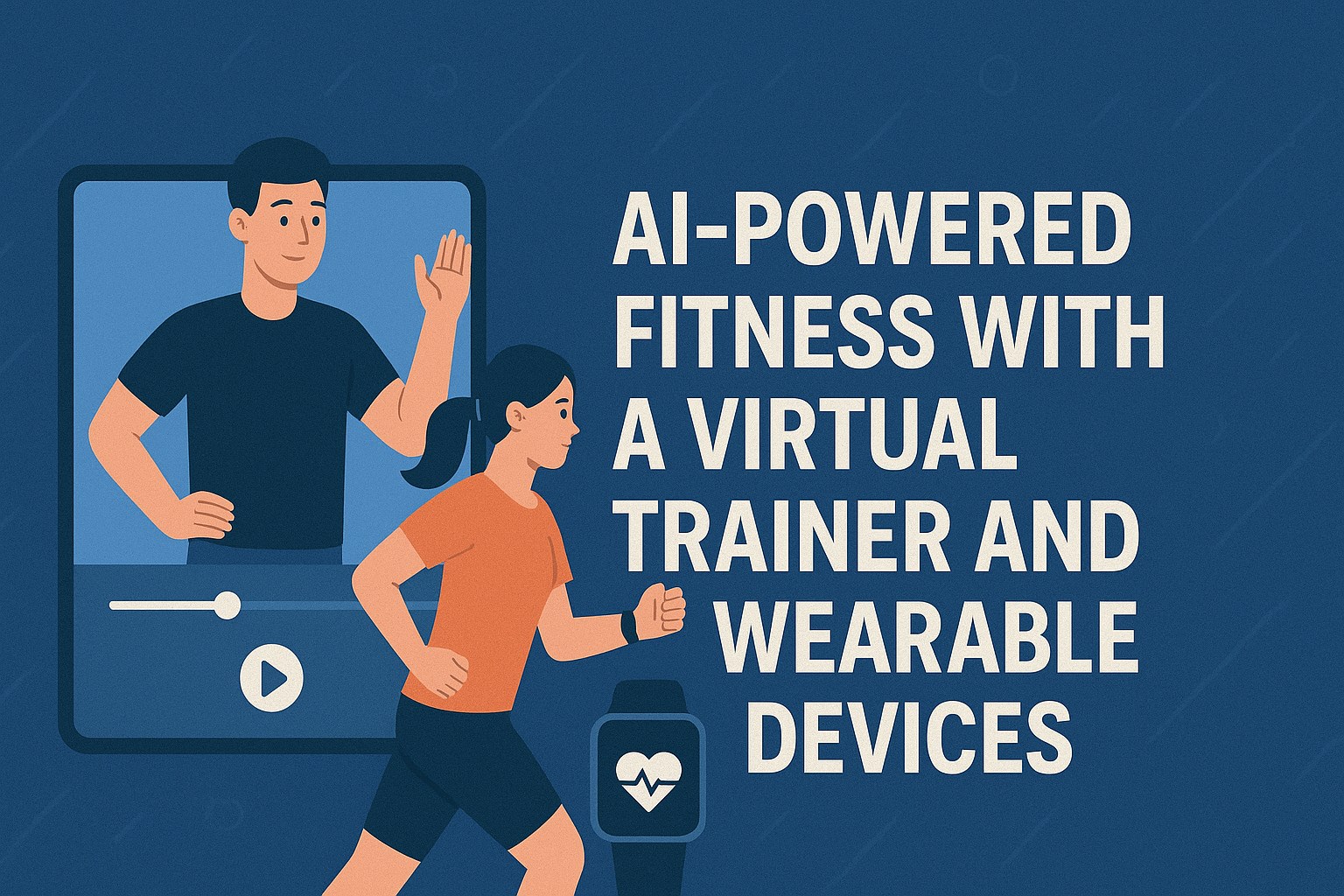Table of Contents
- 1) Virtual AI Trainers
- 2) Personalized Workout Plans
- 3) Smart Wearables
- 4) Real-Time Performance Tracking
- 5) AI in Mental Wellness
- 6) Gamification of Workouts
- 7) Home Fitness Revolution
- 8) Nutrition Integration
- 9) AI for Rehabilitation
- 10) Fitness Communities and Support
- FAQs
Introduction
Fitness in 2025 is smarter, simpler, and more personalized. AI-powered workouts help you train safely, optimize performance, and stay motivated. From virtual trainers to nutrition guidance, AI adapts to your unique needs in real-time.
1) Virtual AI Trainers
AI trainers provide instant coaching using your phone or wearable devices. They detect form issues, suggest modifications, and adapt exercises to your abilities.
Example: During squats, the AI corrects knee alignment and adjusts reps to prevent injury.
- 24/7 guidance without scheduling sessions
- Form correction and injury prevention
- Flexible and cost-effective alternative to personal trainers
2) Personalized Workout Plans
AI learns your goals, fitness level, available time, and equipment to create adaptive routines. Plans automatically adjust to missed workouts or improvements.
Example: Missed two days? AI reduces intensity and adds short recovery sessions to maintain consistency.
- Dynamic progression according to performance
- Time-efficient and equipment-specific routines
- Removes confusion of daily workout choices
3) Smart Wearables
Devices like smart watches collect data on heart rate, sleep, and activity. AI uses this to adjust workouts and prevent overtraining.
Example: High resting heart rate and poor sleep triggers a lighter workout with mobility focus.
- Health data-driven decisions
- Prevents burnout
- Integrates multiple metrics for smarter planning
4) Real-Time Performance Tracking
AI monitors reps, speed, and range of motion, providing instant feedback and automatic rep counting.
Example: Push-up form is corrected mid-rep to prevent hip sagging.
- Instant feedback accelerates results
- Reduces poor technique habits
- Automated timing and tracking
5) AI in Mental Wellness
AI integrates stress tracking and short meditations into your routine.
Example: Offers a 7-minute breathing session before workouts when stress is detected.
- Stress-aware training recommendations
- Quick reset exercises
- Supports mental health alongside physical fitness
6) Gamification of Workouts
AI adds challenges, badges, and competitions to increase motivation and adherence.
Example: Weekly step challenges paired with friends or similar-level users.
- Motivation through points and social interaction
- Short-term goals to build lasting habits
- Workouts feel fun and engaging
7) Home Fitness Revolution
AI-powered smart mirrors, sensors, and interactive devices allow effective home workouts with real-time feedback.
Example: Smart mirror detects incorrect deadlift posture and provides immediate correction tips.
- Convenient studio-quality coaching at home
- Consistent private workouts
- Works well with busy schedules or bad weather
8) Nutrition Integration
AI links workouts with diet recommendations tailored to activity intensity and goals.
Example: Suggests a high-protein meal after leg day and reminds you to hydrate.
- Simple, goal-based meal suggestions
- No extreme diets, realistic plans
- Supports recovery and performance
9) AI for Rehabilitation
AI monitors injury recovery and designs safe, gradual routines.
Example: Shoulder rehab program limits range of motion and adds gentle exercises before full workout.
- Step-by-step “return to training” plans
- Warning alerts for pain or overexertion
- Works alongside medical guidance
10) Fitness Communities and Support
AI connects users with groups that match fitness goals and schedules, increasing accountability and support.
Example: Beginner strength group for 20-minute daily sessions tailored to your level.
- Accountability through matched communities
- Social learning accelerates progress
- Supportive peer environment increases habit adherence
Related Posts
- 10 Daily Habits That Will Change Your Life in 30 Days
- How to Boost Your Mental Health Naturally
- Top 10 Health Trends in 2025 You Shouldn’t Ignore
FAQs on AI-Powered Workouts
1) Are AI fitness apps better than human trainers?
They are more affordable, flexible, and provide constant tracking. Human trainers are still ideal for complex coaching and motivation.
2) Do AI workouts require expensive equipment?
Not necessarily. Many apps work with just your phone or basic wearables. Smart home equipment is optional.
3) Is AI fitness safe for beginners?
Yes. Most apps adapt difficulty gradually and emphasize good form.
4) Can AI help with weight loss?
Yes, it creates calorie-efficient workouts and tracks progress to optimize fat loss safely.
5) Do AI plans adjust if I miss workouts?
Yes, AI recalibrates your plan to maintain consistency without overloading you.
6) Can AI prevent injuries?
By analyzing form and fatigue, AI provides alerts and modifications to avoid common injuries.
7) How do AI workouts track progress?
Through sensors, wearables, and app-based tracking for reps, speed, heart rate, sleep, and recovery.
8) Are AI workouts suitable for all ages?
Yes, AI customizes routines for beginners, middle-aged, and older adults.
9) Can AI replace gym memberships?
For many, yes. Home AI setups with wearables can substitute traditional gym sessions effectively.
10) Will AI fitness continue to improve?
Absolutely. Advances in sensors, machine learning, and personalized guidance will make AI workouts even more effective and intuitive.
Final Thoughts
AI-powered workouts make fitness smarter, safer, and personalized. With AI guidance, real-time feedback, and supportive communities, achieving your goals in 2025 becomes easier and more enjoyable.
